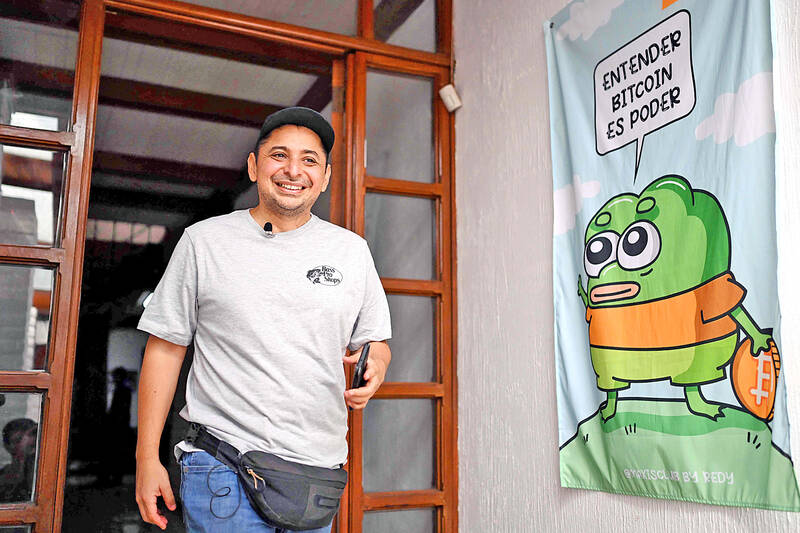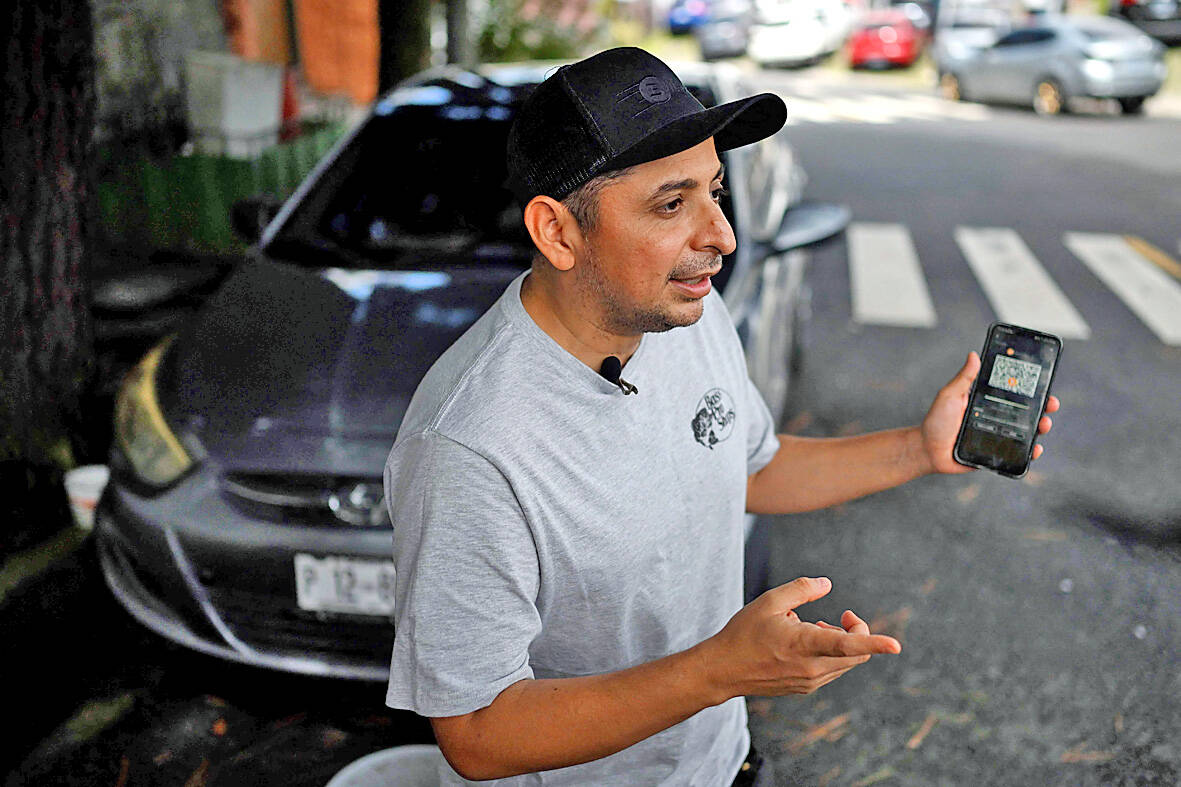Napoleon Osorio is proud of being the first taxi driver to have accepted payment in bitcoin in the first country in the world to make the cryptocurrency legal tender: El Salvador.
He credits Salvadoran President Nayib Bukele’s decision to bank on bitcoin three years ago with changing his life.
“Before I was unemployed... And now I have my own business,” said the 39-year-old businessman, who uses an app to charge for rides in bitcoin and now runs his own car rental company.

Photo: AFP
Three years ago the leader of the Central American nation took a huge gamble when he put bitcoin into legal circulation in a bid to revitalize El Salvador’s dollarized, remittance-reliant economy.
He invested hundreds of millions of dollars of taxpayer money in the cryptocurrency, despite warnings about volatility risks from global institutions.
Osorio credited the US founder of the nongovernmental organization My First Bitcoin, John Dennehy, with encouraging him to accept payment in the cryptocurrency.

Photo: AFP
He now has 21 drivers working for his Bit-Driver brand and has made enough profit from the currency’s rise to be able to buy four rental vehicles.
A divorced father of two teenagers, he also no longer struggles to pay for their education.
Launching bitcoin as legal tender on Sept. 7, 2021, Bukele said he wanted to bring the 70 percent of Salvadorans who do not use banks into the financial system and promptly began plowing public money in cryptocurrencies.
To spur Salvadorans to use bitcoin he created the Chivo Wallet app for sending and receiving bitcoin free of charge and gave US$30 to each new user.
His grand ambitions for bitcoin fell foul of the IMF, which hesitated to grant El Salvador a US$1.3 billion loan because of its official use of the cryptocurrency.
However, last month the IMF announced a preliminary loan agreement with El Salvador, while saying it needed to mitigate “potential risks.”
While Osorio has grown relatively wealthy with bitcoin, a study by University of Central America’s University Institute for Public Opinion showed that 88 percent of Salvadorans had yet to use it.
“From the beginning... It was clear that it was clearly an ill-advised measure that the population rejected,” institute director Laura Andrade said.
One-quarter of Salvadoran GDP comes from remittances sent home by family members, mostly from the US.
However, last year only 1 percent of the transfers were made in cryptocurrencies.
In an interview with Time magazine last month, Bukele acknowledged that while “you can go to a McDonald’s, a supermarket, or a hotel and pay with bitcoin,” it had “not had the widespread adoption we hoped for.”
He added that “the positive aspect is that it is voluntary; we have never forced anyone to adopt it. We offered it as an option, and those who chose to use it have benefited from the rise in bitcoin.”
He also confirmed that he had about US$400 million in bitcoin that is kept in a public “cold storage wallet” — a way of storing bitcoin offline.
Bitcoin’s fortunes have been mixed.
This week it was trading at about US$52,000, down from a peak of US$73,616 on March 13. In November 2022 it fell as low as US$16,189.
Independent economist Cesar Villalona said that Bukele had hobbled bitcoin’s take-up by stripping it of the usual functions of a currency.
“Bukele... said: there will be no salary in bitcoin, there will be no pensions in bitcoin, there will be no savings in bitcoin and there will be no price in bitcoin, and in so doing took away the three functions of money,” Villalona said.
My First Bitcoin instructor Luis Contreras told AFP many Salvadorans were simply afraid of making the switch.
The organization has taken cryptocurrencies into public schools, teaching about 35,000 students to use bitcoin so far.
Contreras said the hardest thing about training people on bitcoin “is their fear of new things, which creates a fear of technology,” as well as “the fear of moving from a classic currency in the current economy to one that is totally digital and decentralized.”

Intel Corp chief executive officer Lip-Bu Tan (陳立武) is expected to meet with Taiwanese suppliers next month in conjunction with the opening of the Computex Taipei trade show, supply chain sources said on Monday. The visit, the first for Tan to Taiwan since assuming his new post last month, would be aimed at enhancing Intel’s ties with suppliers in Taiwan as he attempts to help turn around the struggling US chipmaker, the sources said. Tan is to hold a banquet to celebrate Intel’s 40-year presence in Taiwan before Computex opens on May 20 and invite dozens of Taiwanese suppliers to exchange views

Application-specific integrated circuit designer Faraday Technology Corp (智原) yesterday said that although revenue this quarter would decline 30 percent from last quarter, it retained its full-year forecast of revenue growth of 100 percent. The company attributed the quarterly drop to a slowdown in customers’ production of chips using Faraday’s advanced packaging technology. The company is still confident about its revenue growth this year, given its strong “design-win” — or the projects it won to help customers design their chips, Faraday president Steve Wang (王國雍) told an online earnings conference. “The design-win this year is better than we expected. We believe we will win

Chizuko Kimura has become the first female sushi chef in the world to win a Michelin star, fulfilling a promise she made to her dying husband to continue his legacy. The 54-year-old Japanese chef regained the Michelin star her late husband, Shunei Kimura, won three years ago for their Sushi Shunei restaurant in Paris. For Shunei Kimura, the star was a dream come true. However, the joy was short-lived. He died from cancer just three months later in June 2022. He was 65. The following year, the restaurant in the heart of Montmartre lost its star rating. Chizuko Kimura insisted that the new star is still down

While China’s leaders use their economic and political might to fight US President Donald Trump’s trade war “to the end,” its army of social media soldiers are embarking on a more humorous campaign online. Trump’s tariff blitz has seen Washington and Beijing impose eye-watering duties on imports from the other, fanning a standoff between the economic superpowers that has sparked global recession fears and sent markets into a tailspin. Trump says his policy is a response to years of being “ripped off” by other countries and aims to bring manufacturing to the US, forcing companies to employ US workers. However, China’s online warriors